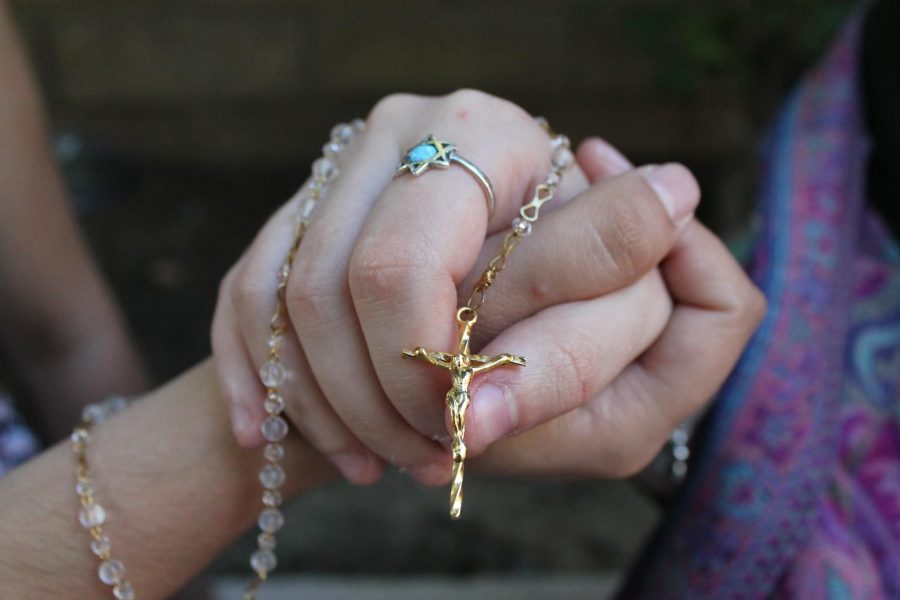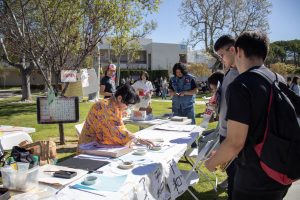Changing religious stigmas
Photo Illustration depicting two religions coming together in unity, one being represented by the Jewish star and the other being the rosary commonly seen in Catholic tradition. Photo credit: Kayla Colon
April 14, 2016
“Christians hate gay people.” “Muslims are terrorists.” “Mormons are prude.” I’ve heard these phrases in an attempt to describe groups of people. The sad part is there are people out there whose actions make me want to believe that these things are true.
I’m Christian and I wish I could say I was always proud and willing to admit that, but I became jaded. I became afraid to be a part of something that was so controversial, that was looked upon so negatively. Why would anyone want to be a part of a group that hates other individuals? That kills other individuals? Turns out though I’m not the only one who had this fear.
“I noticed a lot more [people] staring once I started wearing my hijab, I noticed a lot of hostility,” said Shireen Ismail, California Lutheran University graduate. “I noticed a huge change in everyone’s attitudes towards my mom and my family and myself when I was 9, after 9/11.”
Americans have freedom of religion with the hope to practice that religion without the scrutiny of others. Nowadays that seems like a lot to ask for though.
We keep our beliefs under wraps not wanting to offend anyone or cause an argument. Lord forbid we mention it at work or among “sensitive” people because it’s such a “touchy” subject. Has society become that intolerant, that easily offended? That we can no longer express ourselves.
Religious or not, maybe you’re a tolerant person, maybe you don’t mind the difference of beliefs, but regardless that fear of judgement and conflict is one that several people face.
“I’ve always felt a little tentative on sharing my religion because I don’t want to upset other people and I always feel like it will be outside of someone’s comfort level if I do,” said Trisha Farrugia, interim job placement specialist at Moorpark College.
It would be easy to say it’s the atheists and agnostics and non-believers who are to blame for the stereotypes put on people of faith, but personally maybe the people of faith are just as much to blame.
I’ve seen people get defensive over their religion and honestly I’m guilty of it myself. But when someone tells you that everything you believe in is wrong or starts questioning you, well you can’t help but start to feel uneasy. If that person is of another religion though, that’s when all hell breaks loose. How do you tell someone who believes in the same God that they’re doing it wrong?
It’s easy, you don’t. In writing this article, I learned a lot about other religions and the parallels were astounding. We were all just trying to be good people and practice good morals. We simply shared our opinions and Mickey Aguilar, outreach office assistant, puts that into a good perspective.
“Here we understand that people have the right to believe whatever they want to believe, and if you’re in a discussion you can express your opinion and it’s not to be attacking anybody it’s just to be expressing your opinion,” said Aguilar.
Now I know sometimes people get a little overzealous, but everyone is different. I’m not proud to say that Christians stand on street corners shouting out who should be going to hell, but I am still proud to say that I’m Christian.
Being Christian taught me how to forgive. It taught me how to love unconditionally. And it taught me what it means to be part of a community. It’s those qualities I learned from my faith that I want to show people.
After talking about how negatively Islamic culture is currently being viewed in media, Ismail expressed what she wants people to see from her religion.
“What I would want people to know about Islam, is that Islam is a religion of peace and that Islam is why I behave the way I do,” said Ismail. “Islam promotes kindness it promotes compassion it promotes mercy it promotes justice, it’s very much in fairness and equality and I have all of those values instilled in me because I am Muslim.”
There’s a kind of love and passion you get from religion that is incomparable and I won’t lie, I do want to share it with the world, but never will I try to make anyone feel bad because they don’t share in my faith.
Whether its religion, an ethnic group, or sexual orientation, there will always be stereotypes and there will always be people who make those stereotypes true, but it’s our choice of whether or not we choose to believe they are true for every individual. Maybe it’s time to take it all as knowledge and start learning from each other.
“Say what you would like to say and don’t try to be offensive, don’t try to be rude or obnoxious, understand that people have different faiths and whether you believe or not, it’s learning, you’re learning something,” said Aguilar.









Cathy Walters • Apr 15, 2016 at 3 -07:00.04.
Thank you Kayla,
A nicely written and thoughtful article. Anyone who would like to be supported in expanding understanding among people of different faiths, should look up the group Interfaith Youth Corps, at .
C W
Mary Pusieski • Apr 14, 2016 at 3 -07:00.04.
Kayla:
Accurately, truthfully and expressed beautifully! Empathy, compassion, understanding and acceptance is what I have found to be the truth in the connection to all. It doesn’t matter what you believe, in whom who believe, what diety you believe. When it comes right down to it….respect is the key to acceptance, love and unity among all.
Great job in expressing all sides.